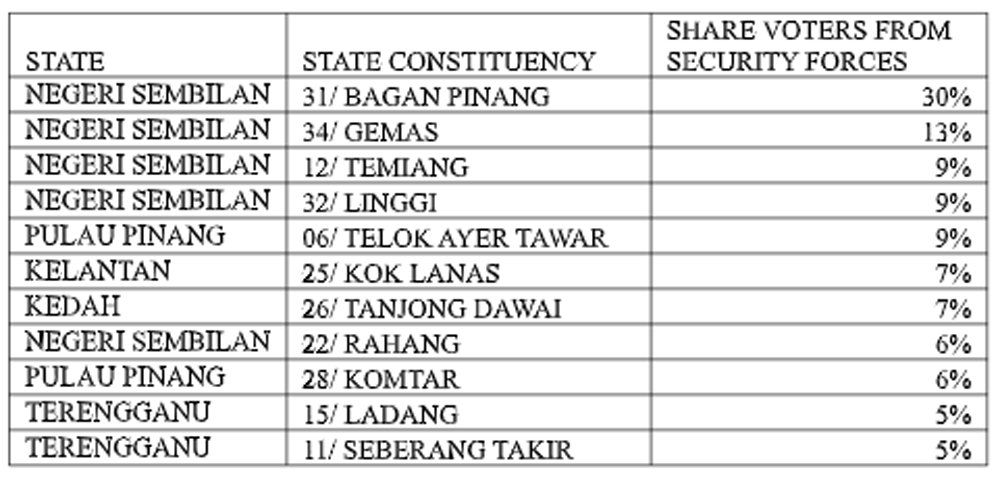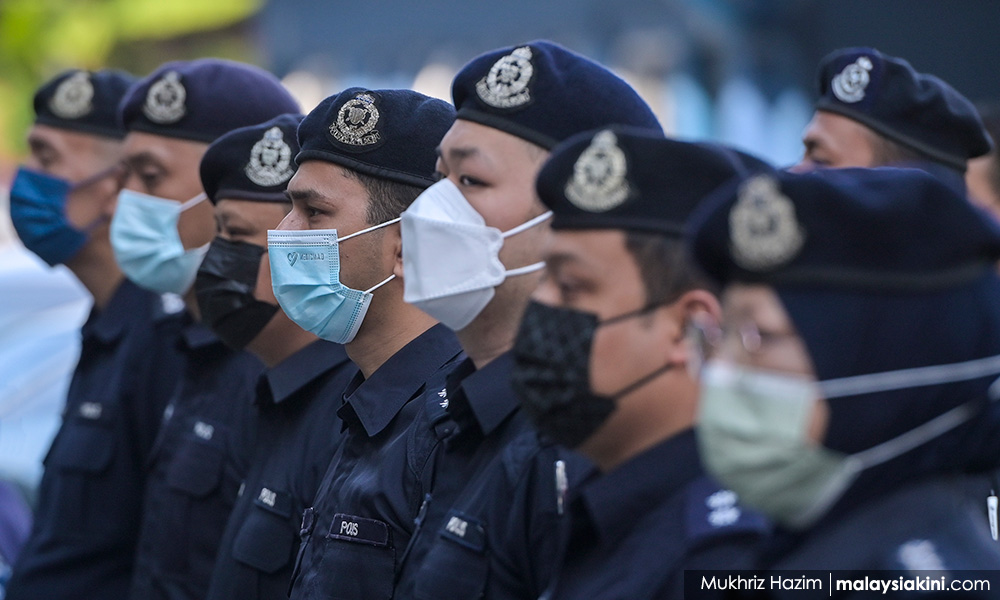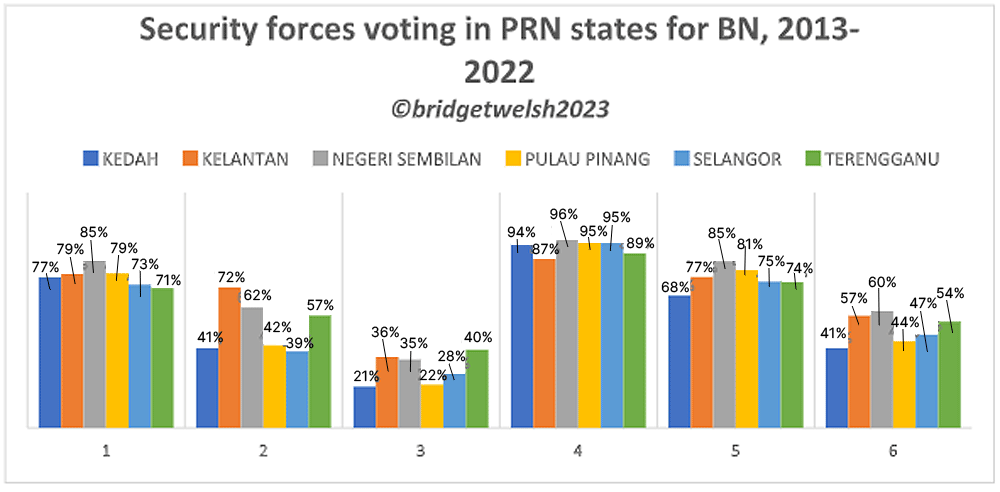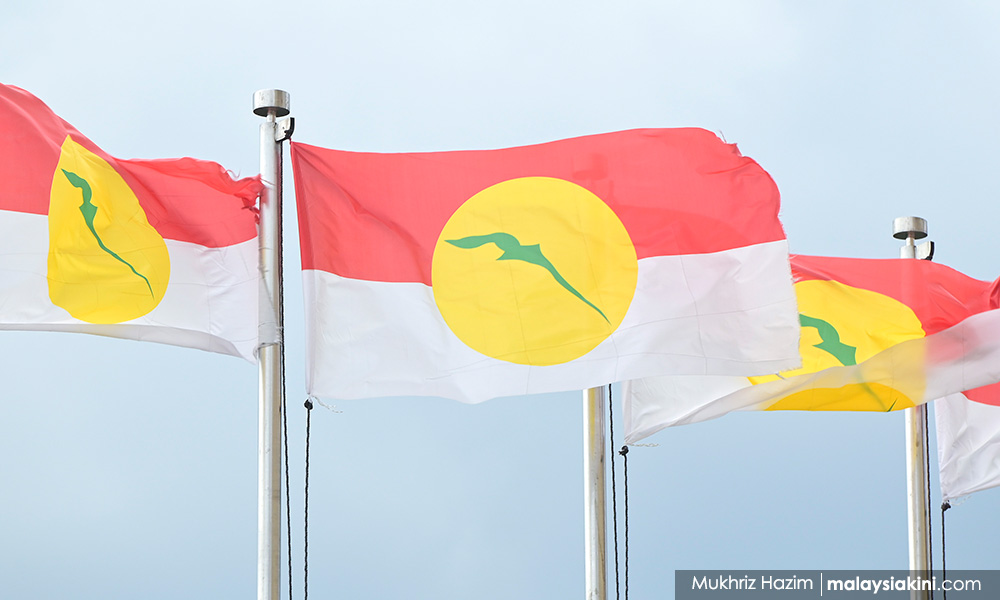Particular groups in Malaysian society have political influence - from private religious teachers to civil servants.
In previous elections, I analysed the pivotal role of civil servants. With 1.7 million civil servants (and their families) they number as much as 15 percent of the electorate.
What makes their influence even greater is that they are often concentrated in particular constituencies, such as around Permaisuri in Setiu, Terengganu - where many are stationed.
Additionally, civil servants have a social standing in the community, often influencing others, especially their family and friends in voting.
This sixth piece in my series about the state polls looks at another important group, Malaysia’s security forces.
This includes both police and armed forces personnel, labelled in the charts as military. They vote earlier and their total vote is recorded separately on electoral score sheets, thus the ability to do this analysis.
Security force numbers
With approximately 115,000 active armed force personnel and 130,000 police officers, this group is much smaller in number in overall votes, but their presence is concentrated in constituencies where they are stationed.
The smaller number of voters in state constituencies (as compared to parliamentary constituencies) and competitiveness of the contests make their votes decisive in influencing electoral outcomes in these coming polls.
There are 11 seats (out of the 245 total to be contested) where security personnel comprise five percent of the vote or more.
The highest share, at 30 percent of voters, is in Bagan Pinang, a competitive contest where Umno has chosen to field the son of party stalwart and former menteri besar Mohd Isa Samad, Mohd Najib.
In 90 of the seats, the security forces comprise one percent of the electorate (or more), so in especially tight races, their votes can be impactful.

In a number of competitive seats in Negeri Sembilan, notably Gemas and Temiang, the security force’s vote will be decisive.
This is also the case in the competitive seats of Seberang Takir and Ladang in Terengganu, Telok Ayer Tawar in Penang, Tanjong Dawai in Kedah and, to a lesser extent due to less electoral competitiveness, in Kok Lanas in Kelantan.
Electoral support findings
In the past, security forces were seen as safety deposit voters for BN. In fact, through 2013, the placement of military camps in constituencies was argued to advantage the then incumbent government.
Since 2013, there has been a change in the voting of security forces.
Using the results in the score sheets, differentiating the military and police vote based on different facilities, the findings show changes in voting over time, differences between the military and police - and differences across the six states where elections are to be held.
The findings for 2013 and 2018 are based on voting results at the state levels, while for 2022, they are drawn from the GE15 parliament election.
Please note that the military category also includes the navy and air force personnel, and the armed forces as a whole.

Here are some observations about the findings:
First, the support for BN has declined overall among security forces. In 2018, most of the decline in BN support went to Pakatan Harapan.
In 2022, the erosion of support from BN went overwhelmingly to Perikatan Nasional. In GE15, the level of support for Harapan across the security forces in the six states studied reached an average of five percent compared to 53 percent of support for PN.
PN has the overall advantage of support among security force voters going into the state polls.
Second, support patterns vary between the military and police. The change in support patterns for the armed forces began in 2018 and did not occur among the police until 2022.
There was also higher support for BN in the police than in the military. In 2022, for example, the majority of police officers in the six states studied voted for BN, 51 percent. For armed forces personnel, the figure for BN was lower at 30 percent.

Third, there is considerable variation in voting across different states. This variation among the security force vote has become more common in the military since 2018 and pronounced in police voting since 2022.
State conditions and voting choices matter. In 2022, the armed forces’ support for BN was highest in Terengganu at 40 percent, with the highest support levels for BN in Negeri Sembilan and Kelantan - 60 percent and 57 percent, respectively.
The lowest levels of security force support in the six states studied for BN were in Kedah and Penang. The GE15 variation in security force vote was evident in support patterns for PN and BN, not among those of Harapan where support levels remained consistently low.
Understanding security vote
The findings show that with greater democratisation in Malaysia, there have been changes in voting patterns among security force personnel.
With an average high turnout of over 75 percent, security force personnel actively participate in elections, taking the responsibility to vote seriously.
The differences in voting over time and within institutions point to how institutional norms and practices are changing. The security forces are no longer a BN vote bank. They are embracing greater freedom with more diversity in voting.
Many looking at the vote patterns would highlight the similarity in total average voting with ethnic voting patterns of Malay voters, the community that comprises the largest share of the forces.
Yet, the differences across institutions and in different states suggest that voting for security force personnel is multi-dimensional. Where they live, where they are originally from, institutional norms and the political choices in different localities they have matter.
Take Bagan Pinang in Negeri Sembilan as illustrative. Umno has fielded a candidate with family ties to a local warlord and a father tied to governance concerns in Felda.
Most of the stationed staff there are not locals, and do not have the local political loyalties and knowledge of the state’s politics.
The placement of a local candidate to appeal to local loyalties does not resonate to the same degree among those from outside. Many are also young personnel, more likely to swing their votes, looking to the future rather than the past. Bagan Pinang is now a high-risk seat for Umno.

Come next month, security personnel stationed in the six states will once again cast their vote. For BN, who long relied on their support for decades, this is no longer the same guarantee it once was.
Ironically, unlike in the past, the constituencies with the largest share of security forces’ votes are among the most vulnerable. - Mkini
BRIDGET WELSH is an honorary research associate of the University of Nottingham, Malaysia’s Asia Research Institute. She is also a senior research associate at the Hu Fu Centre for East Asia Democratic Studies and a senior associate fellow at The Habibie Centre. Her writings can be found at bridgetwelsh.com.
The views expressed here are those of the author/contributor and do not necessarily represent the views of MMKtT.



No comments:
Post a Comment
Note: Only a member of this blog may post a comment.